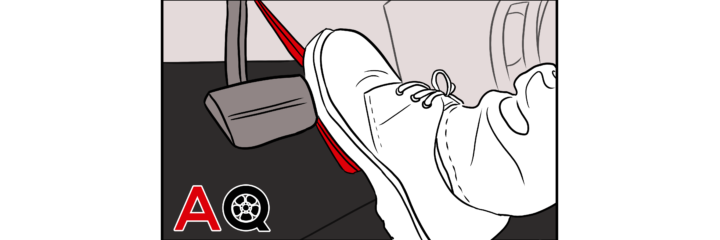If your car doesn’t stay running unless you step on the gas, then the problem could be a fault in the fuel supply system, ignition system, or the engine components and sensors.
Your engine could also shut off if the engine idle value is set too low.
Your car keeps running as long as your foot is on the pedal because the system just feeds more fuel to the engine as long as you accelerate, keeping the engine’s revolutions per minute (RPM) levels above the base rate. Once your foot is off, the RPM falls below the base rate of ~800 (this can vary based on the car’s specifications), and the engine shuts off as the gas supply is interrupted.
Idle Control Valve Failure
The Idle Control Valve is in charge of maintaining the engine’s idle speed. Excessive carbon buildup in the intake manifold could lead to a faulty idle control valve. This will be indicated by the “Check Engine Light” if your car has one. Use a code reader to identify whether the problem lies with vacuum leaks, electrical connections, or carbon intake. Replace the idle control valve if it’s faulty. Once you’ve fixed this problem, the Check Engine warning light should turn off, and your engine should perform properly.
Depending on the make and model of your vehicle, Idle Control Valve replacement costs could vary from $140 to $1,200. Getting the air induction system serviced every three years is a good way to avoid carbon buildup in the intake manifold.
Fuel Supply Faults
Air filters, injectors, clogged fuel filters, bad gas, or other fuel supply system components could be contaminated, compromised, or worn out if your engine’s RPM drops below the base rate. Get the air system checked to ensure there are no leaks, buildups, or untoward airflow in the wrong areas to fix the problem.
Ignition System Problems
Problems in the ignition system like faulty ignition coil, flawed spark plug, or faulty spark plug wires could also lead to your car shutting off when your foot isn’t on the gas pedal.
Check your ignition components and spark plug wires to determine whether they’re in the proper position and condition. Loose and detached wires and mal-performing spark plugs can lead to engine stalling due to misfires.
This will result in the engine running on fewer cylinders, leading to a drop in the base rate of RPMs required to keep the engine running. This is why, when you take your foot off the gas pedal, the vehicle stops.
Problems With Engine Sensors and Components
Problems in engine components and sensors like Exhaust Gas Recirculation (EGR) system, Positive Crankcase Ventilation (PCV) system, Mass Air Flow (MAF) sensors, bad vacuum lines to the transmission, and throttle position sensors could also result in RPMs dropping below the normal range. If you can identify the problem with the help of the Check Engine Light warning system and fix it, well and good. If not, get your vehicle to a mechanic to resolve the issue.
Car stalling due to a drop in RPMs isn’t a critical issue, but one you should attend to if you want to take it out for a drive and not squander unnecessary fuel.


